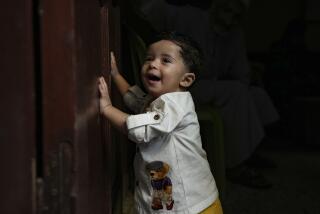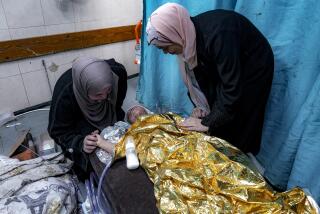Bombing Has a Young Afghan Starry-Eyed
- Share via
BAGRAM AIR BASE, Afghanistan — Nasir Aqa is a front-line mascot, a little boy who brings bread and water to soldiers and learns the ways of war at their feet.
The 9-year-old Afghan has already shot a Kalashnikov rifle at the enemy and has seen younger comrades die under fire.
He lives with his father, mother and four brothers and sisters on the edge of this ruined air base, which is controlled by the anti-Taliban forces of the Northern Alliance. The Taliban regime’s troops are dug in just over a mile away and regularly fire artillery at the airport and Nasir’s village.
Now fighter jets are dropping bombs nearby. The U.S. airstrikes targeted Taliban positions close to the Bagram front for a second straight day Monday. Nasir finds it all great fun.
War scared his son when he was younger but not anymore, Mir Aqa said through an interpreter. “It doesn’t have any bad effects,” the father said. “He doesn’t cry.”
Then Aqa admitted that might not be so good. “Fighting is bad,” he said, as Nasir clung to his leg. “Everyone should be afraid of that.”
Less than an hour after he spoke, two fighter jets that appeared to be U.S. F/A-18 Hornets roared over Bagram and began dive-bombing Taliban targets just north of Kabul, the Afghan capital.
They came in from the east about 4:10 p.m., just before Muslim prayer time--two silver darts, glinting in the sunset, that bombed and circled and then struck again. Bright orange blasts sent roiling columns of smoke and dust hundreds of feet into the air.
Northern Alliance troops monitoring field radios on a rooftop observation post said a frantic soldier had reported that at least one bomb exploded inside alliance-held territory, near the main highway turnoff to Bagram. The soldier made no mention of any casualties in the report, which he repeated several times. It couldn’t be independently confirmed Monday night.
Other walkie-talkie reports said the two main targets were Qalai Nasro and Qarabagh, 25 miles and 15 miles north of Kabul, respectively.
“The first two bombs didn’t quite hit the place we wanted, but the second two looked as if they got it exactly,” Gen. Babajan, the Northern Alliance’s commander at Bagram air base, told his men by radio.
By 4:40 p.m., the jet noise had trailed off. A man in the yard next to the observation post continued his prayers.
Babajan, who like many Afghans goes by one name, told reporters that U.S. warplanes had attacked Taliban reserve units Sunday during airstrikes on the village of Yuzbashi, about a mile southeast of Bagram. The commander told reporters that the troops included Arabs, Chechens, Pakistanis and Uzbek fighters who support the fundamentalist regime. Some were controlled by Osama bin Laden, the general claimed.
Bin Laden has been identified by the Bush administration as its prime suspect in the Sept. 11 attacks on the U.S. He is believed to be hiding in Afghanistan.
Asked if the anti-Taliban alliance had helped U.S. military planners choose the targets, Babajan replied playfully, “They have collected that information from journalists.”
Bombing along a front line is especially tricky without the aid of troops on the ground, known as forward air controllers. They help a pilot distinguish between friend and foe by calling in coordinates or using laser pointers to guide bombs to the intended targets.
But Babajan denied suggestions, including some from his own troops, that U.S. soldiers had been at Bagram to help with targeting during Sunday’s airstrikes.
The general repeated the alliance’s hope that the United States and its allies would launch more intense and frequent strikes on front-line Taliban fighters, which would make it easier for the poorly equipped opposition forces to launch a push toward Kabul.
“Of course we plan to advance and protect our country when the right time comes, but right now we do not have concrete plans,” the commander said.
Secretary of State Colin L. Powell said Sunday that he believed the Northern Alliance troops were likely to soon “start moving on Kabul more aggressively.”
But firing across the front north of Kabul was still light Monday, and when a Taliban artillery shell whooshed overhead about 3 p.m., Nasir didn’t flinch. He was more interested in hearing the news bulletin on his father’s shortwave radio.
The child knows too well what an incoming shell sounds like. He has a soldier’s ear when it comes to judging how close it’s likely to land. This one would explode in the distance, with a muffled thud.
Last Tuesday, a Taliban artillery shell fell in front of Nasir’s neighbor’s house about 4 p.m. and killed two friends, Nasir, 6, and Lemar, 8, said their father, Turgul, who also goes by one name.
“They were playing outside the house and the Taliban fired,” said Turgul, a Northern Alliance soldier stationed here.
Najina, 9, survived the blast. A piece of shrapnel took out her left eye, and the wound was still raw and oozing Monday.
Aqa is an air force radio operator for the Northern Alliance and has been a combatant for 12 years. He is a polite man, with a neatly trimmed beard and a pen in each pocket of his gray vest. He looks and sounds more like a school principal.
His son is a soft-spoken boy in dusty clothes, with plastic sandals that are eroding at the toes. Nasir is happy to hold his father’s hand when they walk, and it isn’t only out of love. There are land mines everywhere. Just last week, two soldiers at Bagram were badly wounded by the weapons.
Nasir is the troops’ willing servant. He brings them meals at 7 a.m., noon and 7 p.m.--unless fighting interrupts his schedule.
Nasir gets up at dawn each day and spends an hour studying the Koran at a mosque. He doesn’t get paid for delivering food, but sometimes one of them tips him with a 10,000-afghani note, which is worth about 25 cents.
Nasir makes the deliveries more for the soldiers’ company anyway. He spends hours each day sitting with them at a guard post on the air base, which the Soviets built to support their 10-year occupation of Afghanistan.
During the civil war that followed the Soviets’ 1989 withdrawal, Bagram was reduced to ruins. The airport and surrounding villages have changed hands three times since the Taliban took Kabul in 1996.
Nasir was only 4 years old then. Three years later, when he wasn’t much taller than an AK-47 assault rifle, the child fired one for the first time.
“I shot at the Taliban,” Nasir said Monday, and he grinned.
To show he wasn’t making up his knowledge of weapons, the boy took a soldier’s Kalashnikov, cradled it in the crook of his arm and pulled the bolt with a loud clack to load a round in the chamber. Then he tilted the weapon to reach the safety, which he unlocked.
He was about to put his finger on the trigger when one of the laughing soldiers grabbed the gun.
“He is very smart and he learns fast,” Aqa said. “He listens to his father and mother. He fights with other children sometimes, but they’re just playing, not really fighting--just for a few minutes.”
Nasir, who is in second grade when he isn’t sitting with the soldiers, said he hopes Afghanistan’s more than two decades of war will be over by the time he is old enough to be a soldier. He would rather be a teacher.
Nasir was confused for a moment when a visitor asked whether he knew who had been bombing the area the day before.
“The Taliban,” the boy said, and then a soldier corrected him: “America.”
When the visitor asked Nasir if he knew where America is, he quickly pointed to the east, the direction from which the U.S. jets came Sunday and Monday.
He was most clear on why the war he has grown up with has suddenly heated up.
“America is bombing to kill the Taliban,” Nasir said. “Osama bin Laden is a Taliban,” he said, getting that point wrong, and then added: “He is not religious. He kills people.”
More to Read
Sign up for Essential California
The most important California stories and recommendations in your inbox every morning.
You may occasionally receive promotional content from the Los Angeles Times.













